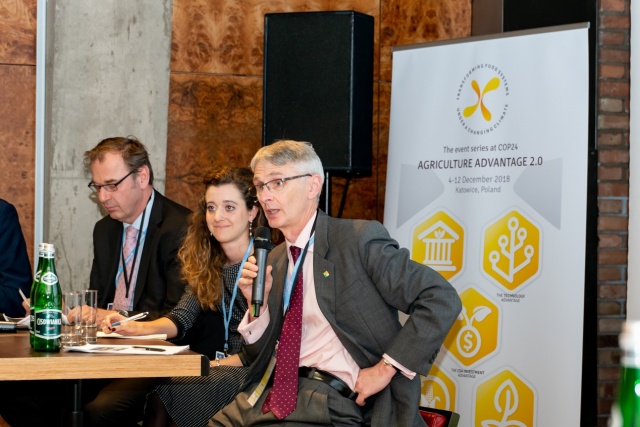
At the closing session of the Agriculture Advantage 2.0 event series at COP24, keynote speakers and representatives from the events in the series joined together to discuss stepping up action to drive a transformation within global food systems.
Moderated by Mi Nguyen, Deputy Permanent Representative of Canada at the Food and Agriculture Organization of the United Nations (FAO) and Co-Chair of the Global Alliance for Climate-Smart Agriculture (GACSA), and Bruce Campbell, Program Director of the CGIAR Research Program on Climate Change, Agriculture and Food Security (CCAFS), the event aimed to bring together the different areas of action for transforming food systems discussed in the series and identify other areas needed for a true systems approach. Planetary health, farmers, and nutrition were three additional dimensions discussed.
Planetary health: a systems approach
“When we look at planetary ill health, there are multiple interconnections. Land use, agriculture and food systems sit at the heart of future planetary health.”
Sam Bickersteth, Executive Director, Rockefeller Foundation Economic Council on Planetary Health
The concept of planetary health is a useful framing that links ecological systems and human societies. Sam Bickersteth highlighted the need for better mechanisms to govern and oversee planetary health in order to ensure welfare for everyone. He called for better monitoring and evaluation, reformed subsidies, taxes and regulations, and international collaboration of state and non-state actors to accelerate finding solutions.

Sam Bickersteth introduces the topic of planetary health. Photo: Barbara Ogrodniczak
On the topic of reformed subsidies, Martien van Nieuwkoop, Director of the Global Agriculture Practice at the World Bank, agreed: realigning public spending to finance research and development will be important for creating a sustainable food future, he noted. But how can we determine what to finance? Angela Falconer, Associate Director at the Climate Policy Initiative (CPI) and representative of the Food Systems Finance Advantage session, argued that developing different pathways for different countries and sectors will be crucial to ensuring a clear vision of what to finance and how to increase capital to make projects happen.
The farmer advantage
Thinking about the different stakeholder groups that need to work together to reach a sustainable food future, Giulia De Castro of the World Farmers Organization (WFO) emphasised the importance of one in particular—farmers.
“Everyone eats food. Everyone is involved in the food system. But farmers are at the base of this network—they play a key role.”
Giulia De Castro, Junior Policy Officer, WFO
We need a farmer-driven approach, she argued, citing The Climakers, an initiative launched by WFO at COP24, as an important step in that direction. Farmers need to have access to resources, need to be empowered and must be owners of their own development. However, they will not be able to do so alone, thus stakeholders across the globe will need to mobilise to help them.
Including farmers in decision-making processes would enable better outcomes, such as farmers actually adopting recommended practices, agreed Majola Mabuza, Policy Programme Officer at the Southern African Confederation of Agricultural Unions (SACAU) and representative of the Soils Advantage session. Connecting scientists and researchers with farmers will also be important for achieving change, said Craig Mackenzie, Chairman at Precision Agriculture Association New Zealand and representative of the Policy Advantage session. Transformation has to come from collaboration, and our collective efforts should be based on what farmers need, he argued.
Dawit Solomon, CCAFS East Africa Program Leader and representative of the Technology Advantage session, noted that digital and ICT-based solutions for smallholder farmers will be useful for meeting some of farmers’ knowledge and information needs, and can also help to address gender inequality.
Nutrition security
We need to think not only about food security, but also nutrition security, noted Ilaria Firmian, Environment and Climate Knowledge Officer at the International Fund for Agricultural Development (IFAD) and representative of the CSA Investment Advantage session. Nutrition will also be affected by climate change, she argued, and we need to look into alternative sources, like fish.
Michael Phillips of World Fish elaborated on the potential nutrition and climate benefits that oft-neglected sector of the food system: aquaculture.
“Aquaculture may be a small part of the food system currently, but it has been growing fast globally in recent years. Fish could be part of the solution to food systems transformation, and a piscivorous diet also has many nutritional and health benefits.”
Michael Phillips, Director of the Aquaculture and Genetic Improvement, World Fish
However, he noted that aquaculture will also become more vulnerable under a changing climate, and there is a need to promote adaptation and mitigation practices in this sector as well.
We must work together
Bruce Campbell of CCAFS closed the session, bringing the discussion back to the transformative power of collective action:
“A lot of really exciting initiatives and projects already exist in different formats. The question is how do we join them up. How can we really come together and act collectively to meangingfully change the system?”
Bruce Campbell, Program Director, CGIAR Research Program on Climate Change, Agriculture and Food Security (CCAFS)
With no silver bullet answers to climate change and food security, we will have to work together to achieve the global goals for mitigation and adaptation, and to feed a growing population.
Read more:
- Briefing: A 6-part action plan to transform food systems under climate change, available in 2 formats: Exposure story with animated graphics | downloadable Info Note
- Koronivia submission: Submission from the CGIAR System Organization, International Centre for Tropical Agriculture and the World Bank, in response to Decision 4/CP.23
- Journal article: Transformation in Practice: A Review of Empirical Cases of Transformational Adaptation in Agriculture Under Climate Change
- Global Commission on Adaptation report: Feeding the World in a Changing Climate: An Adaptation Roadmap for Agriculture
- Journal article: National contributions to climate change mitigation from agriculture: allocating a global target



